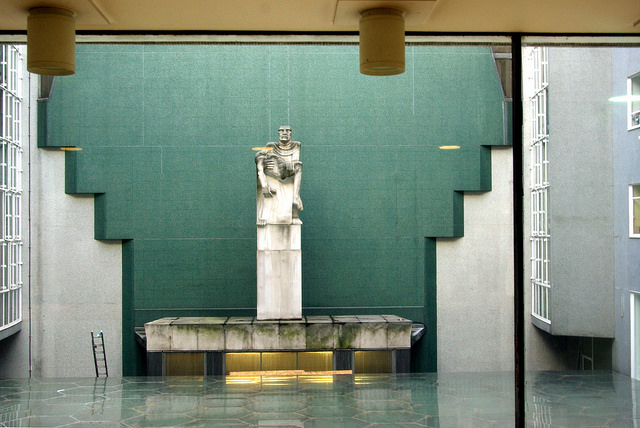Democracy in the workplace is an idea whose time has come
We are very comfortable with the notion of political democracy, but less comfortable when it comes to the workplace, often preferring to defer to the better judgement of our bosses and superiors. A new Trades Union Congress report on workplace democracy seeks to dispel some of the myths surrounding industrial democracy, showing that it need not imply an ‘anti-business’ agenda for the political left, according to Tim Page.
Today, the TUC launches ‘Democracy in the Workplace: Strengthening Information and Consultation’. This report is part of a wider theme, developed by the TUC in recent years, designed to give workers a say in how their companies are run.
Such a say, in theory, already exists. In 2005, the Information and Consultation of Employees (ICE) regulations were introduced, giving workers a chance to influence major company decisions affecting them. Nine years on, the ICE regulations look like a lost opportunity. They are neither widely used nor widely understood. Yet those most affected by changes such as company restructuring are, of course, those that work for the company itself.
As is so often the case, other countries, particularly in Northern Europe, handle these situations well. In those countries, works council members, who are usually trade unionists, are able to give a workers perspective on corporate strategy. This gives the union powerful rights – and major responsibilities. When faced with the need to make changes that affect the workforce, the easiest thing to do is resist. But suppose the better long term decision for the company is to make those changes? Works councils challenge employee representatives to look at this problem from both perspectives. In practice, worker representatives rarely block change. They are more likely to try to influence the way that change is made in order to safeguard, sometimes to even strengthen, the position of the workforce.
For this report, the TUC visited Sweden, working with our trade union colleagues in the metalworkers union IF Metall. Swedish colleagues were perplexed at the idea that companies wouldn’t wish to discuss corporate strategy with their unions. Roger Nilsson of IF Metall told us: “The labour cost in every business is the highest cost … and you’re not interested to discuss matters of interest within your company and your workers?” Annika Ogren, IF Metall rep at the power tool company Husqvarna, told us her factory manager “understands that things he hears from his manager, its one side, and we can give him more information he will never hear about if we don’t tell him.”
France has also made information and consultation work well. David Tornadre, Senior Executive Vice President of the French transportation company Thales told the TUC:
“What [the unions] want is to have access to the information. They want to be taken seriously … to have an influence as early as they can to be able to indeed make sure that the actual transformation of the organisation is done with the people dimension built into it.”
Sibylle Quere-Becker, Director of Human Resources at AXA, the insurance company, said:
“We have got a regulatory environment, it’s a fact, so now either you think it’s a threat or you can think it’s an opportunity. We think in AXA that this can be an opportunity … with a strong social dialogue and having, I would say, good relationships with the union.”
As is clear, this is not revolutionary, nor anti-business. It is simply about giving worker reps an opportunity to put, as David Tornadre says, the “people dimension” into decision making. How to bring this about? ‘Democracy in the Workplace’ calls for the right to a works council if a minimum of five employees request one. Employers should also be obliged to negotiate information and consultation arrangements if requested to do so by a recognised trade union. A basic constitution for a works council should be developed by the Department of Business, working with the TUC and CBI, and deviations from this constitution should only be possible to improve its provisions.
The UK needs a new deal at work. Democracy should not be left at the factory or office gate. The recommendations in ‘Democracy in the Workplace’ will make Britain’s economy stronger and fairer. They should be implemented as soon as possible.
—
Note: this post represents the views of the author and not those of Democratic Audit or the LSE. Please read our comments policy before posting. The shortened URL for this post is: https://buff.ly/1mkv98W
—
 Tim Page is Senior Policy Officer at the TUC, responsible for economic and industrial policy. I also cover science policy, public procurement and high performance workplaces.
Tim Page is Senior Policy Officer at the TUC, responsible for economic and industrial policy. I also cover science policy, public procurement and high performance workplaces.





 Democratic Audit's core funding is provided by the Joseph Rowntree Charitable Trust. Additional funding is provided by the London School of Economics.
Democratic Audit's core funding is provided by the Joseph Rowntree Charitable Trust. Additional funding is provided by the London School of Economics.
Democracy in the workplace is an idea whose time has come https://t.co/kwZzHvVlmk
Democracy in the workplace is an idea whose time has come in the UK https://t.co/OS2pZWquno
Democracy in the workplace is an idea whose time has come https://t.co/Lx8VcJSOPk